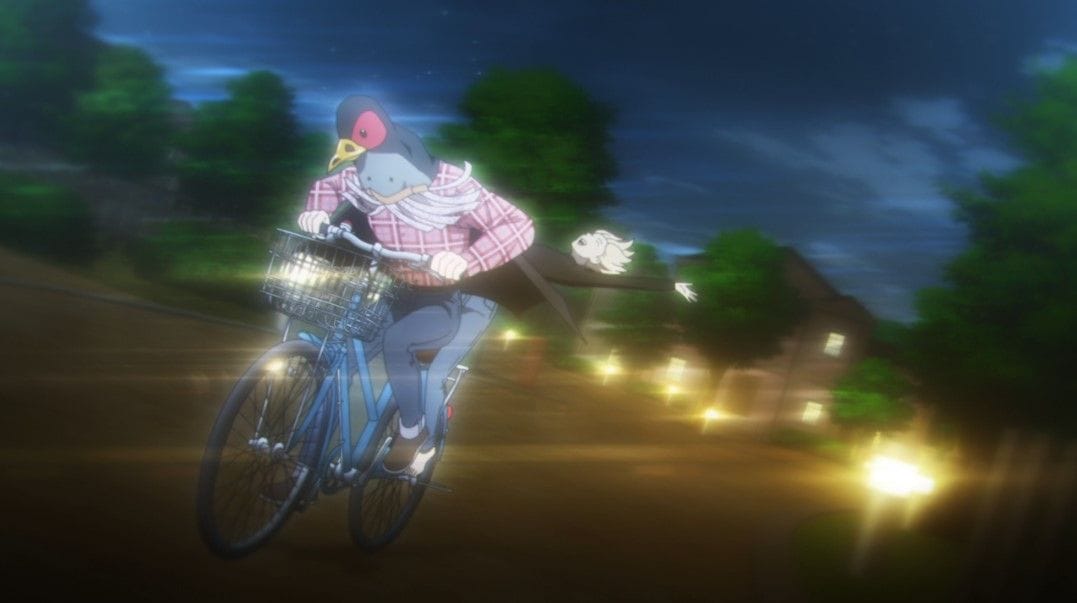
A Very GLORIO 2023: Zigg’s State of the Union
You may have noticed a running theme if you’ve been reading all of my distinguished colleagues’ end-of-year posts (which, incidentally, I heartily recommend doing). 2023 hasn’t been a particularly good year for anime. Regretfully, I have to agree with that conclusion. For the most part, this year has felt like the studios are treading water, frantically searching for fresh concepts and fashions to grab hold of while keeping the wheels turning with sequels and follow-ups. Not that there weren’t any good concerts among the garbage, but it felt like there weren’t as many of them this year as there were last.
This reflects, in part, an industry that is going through an intriguing period of change. As I mentioned in my piece from the previous year, franchise extensions and sequels appeared to rule 2022, and in fact, that trend seemed to pick more speed in 2023. Western distributors and streamers are gaining more and more sway on anime production committees as the popularity of anime continues to soar in non-traditional markets like the English-speaking world. Large numbers of people from outside of Japan were involved in some of the biggest and most notable projects of the year. Netflix, for example, bankrolled Pluto and the live-action adaptations of One Piece and Yu Yu Hakusho, and Crunchyroll continued to tighten their hold on the streaming market by acquiring media distributor Rightstuf. To put it another way, anime is now more popular than ever, and popular culture tends to support safe, surefire investments like franchise expansion.
That’s not always a bad thing, though, as this year saw many successful results from that broader focus. For instance, Pluto might never have made it out of development hell without Netflix’s help, and Scott Pilgrim Takes Off was a great illustration of how anime sensibilities and a western story can coexist. I also have no doubt that part of what keeps Spy X Family’s production levels so high is the show’s ongoing global appeal. Even still, I can’t help but be a little leery of the trend, especially considering how unsatisfactory I found a lot of the continuations and sequels that were released this year. The biggest change came in Birdie Wing, which went from inspired madness to a passable sports comedy with a few funny lines. Even while it was never going to be easy to replicate the intense, subterranean golf mafia chaos of the first season, there was enough of a decline that it seemed like a big letdown.
The second half of Mobile Suit Gundam: The Witch from Mercury was equally disappointing, despite the fact that the decline was not nearly as severe or detrimental. This was primarily due to the show’s gradual shift in focus towards the corporate conflict that had been taking place in the background of the first half of the story. The problem is that, while the grand political drama of the best Gundam shows is compelling, I never found the overly complicated cold war of corporations, subsidiaries, and CEOs to be as engaging. Witch from Mercury also had to give up a lot of the nice breeziness and character development that had made its first half such a pleasure to watch in order to put this drama front and center. In this sense, I sympathize with the writers because it’s impossible to produce a show both lighthearted and a serious, thought-provoking narrative at the same time. However, I do wish they had chosen a different course of action. It’s unfortunate that I never saw much of a connection between the space-based conflict and Earth, as the Earth-based storylines had some of the most compelling and gritty storytelling on the show. Another flaw in the finale was its confused narrative and excessive reliance on the tried-and-true Gundam Space Magic to resolve issues. Nevertheless, in spite of these complaints, I thought Witch from Mercury was the finest Gundam media in a long time because of its compelling narrative, excellent mech fights, and powerful cast of characters. Based only on anecdotal evidence, it appears that the series was a great place for many new fans to start, and I’m happy that they were able to start with a top-notch program.
Keeping with the pattern of shows that were both good and disappointing, Heavenly Delusion is a show that we really don’t know where to start. Given how well it told its tale and featured likable and charming characters in a bizarre and hostile environment that nonetheless harbored enough humanity to allow for hope for the future, there is a strong case to be made for it being the finest show of the year. In my opinion, episode 8 was the best single episode of the year. It was a tragic story of love and death that was both incredibly sad and dark, as well as incredibly beautiful. The tragedy only deepened as the show progressed and its origins were revealed.
Given the attention to detail and skill that went into creating such a remarkable television program, it’s nearly impossible that the same show could also produce one of the worst episodes of the year, which was episode 11, a meaningless, scuzzy, and jaded collection of rape clichés. I won’t go into too much detail because I think the majority of this should be clear to anyone with even the most basic level of media literacy. To be clear, sexual assault is not something that should be forbidden in stories; rather, it’s frequently used as a convenient crutch to illustrate how terrible a villain is, how defenseless a heroine is, and how brave our hero is to come to her aid. And that’s precisely what occurs in this instance, right down to the last detail. Put aside the overall strange, eerie, and atonal nature of the piece—which, for the record, is a lot—it’s just awful writing, period. Even worse, writing sexual assault that is of a high caliber spreads like poisoning, seeping into everything it comes into contact with. The follow-up finale episode is genuinely quite wonderful at times, even great, but it’s all made easy by the fact that we have to wrap up this terrifying, transformative experience in just 22 minutes in order to have our optimistic, “the adventure continues” conclusion. It annoys me so much that I have to discuss this terrible stuff instead of telling you about all the wonderful aspects of Heavenly Delusion that I found enjoyable, such as the stunning animation, the surprisingly complex handling of gender dysphoria, or the engrossing puzzle-box plot full of entertainingly bonkers science fiction concepts. But now that the show has made its bed, it must sleep in it. How unfortunate.
I would be negligent if I did not mention a few movie-related disappointments while we are discussing disappointments in general. To my senses, Gridman Universe was by far the most depressing of these. Yes, this was a classy production with many of well-known characters, some amazing tiny character development tidbits, and some great gigantic robot vs. monster action. It did not, however, have the qualities that I had grown to strongly identify with the Gridman/Dyanzenon duology—that is, reflective, contemplative narrative that provided us with a more thorough understanding of the lives, feelings, and experiences of our protagonists. Maybe I was expecting too much from something that was clearly marketed as a big rock-em-sock-em movie, but I would argue that Trigger deserves more credit for producing such intelligent, well-balanced TV series. Those cretins.
In a similar vein, I didn’t enjoy Hideaki Anno’s highly anticipated Shin Kamen Rider, mostly because Anno didn’t appear to want to accept the franchise’s intrinsic pulpiness. Even if Shin Godzilla and Shin Ultraman benefited greatly from his austere, respectful style, Kamen Rider felt more like a sentimental reproduction than a genuine attempt to update the original tale—despite the abundant claret. In the end, Anno’s film is too distant and emotionless to fit in with the endearingly campy Kamen Rider universe, as I mentioned in my review.
 That is a huge amount of letdowns! Instead, how about we take a different tack and discuss some happy surprises? Pluto has to be the most important object on this topic, not because of the art itself (I read Urasawa’s brilliant reinvention of Astro Boy many years ago), but simply because it exists at all. Since the manga’s first release, the concept of a Pluto anime has been floated in one form or another. This specific project has been mired in development hell since 2017, thus the fact that it materialized quickly and entirely was cause for joy in and of itself. Although Pluto is such a masterfully written and dramatic narrative that it’s difficult to mess up if you reach a certain degree of proficiency, I was nonetheless impressed by the attention to detail and astute decisions made in this adaptation. One of my main criticisms of Urasawa’s manga is that, despite its obvious excellence and captivating storyline, it occasionally comes across as a little detached and impersonal in its genius, especially when contrasted with the vivid cartoonishness of the Tezuka original. Even though the impression isn’t entirely dispelled, the animated version greatly improves the story’s drama and depth by adding voice acting, music, and other visual effects. It also adds a human element that the manga version occasionally lacked. It’s an amazing production that honors the illustrious original work.
That is a huge amount of letdowns! Instead, how about we take a different tack and discuss some happy surprises? Pluto has to be the most important object on this topic, not because of the art itself (I read Urasawa’s brilliant reinvention of Astro Boy many years ago), but simply because it exists at all. Since the manga’s first release, the concept of a Pluto anime has been floated in one form or another. This specific project has been mired in development hell since 2017, thus the fact that it materialized quickly and entirely was cause for joy in and of itself. Although Pluto is such a masterfully written and dramatic narrative that it’s difficult to mess up if you reach a certain degree of proficiency, I was nonetheless impressed by the attention to detail and astute decisions made in this adaptation. One of my main criticisms of Urasawa’s manga is that, despite its obvious excellence and captivating storyline, it occasionally comes across as a little detached and impersonal in its genius, especially when contrasted with the vivid cartoonishness of the Tezuka original. Even though the impression isn’t entirely dispelled, the animated version greatly improves the story’s drama and depth by adding voice acting, music, and other visual effects. It also adds a human element that the manga version occasionally lacked. It’s an amazing production that honors the illustrious original work.
The second and last surprise I have for you this year is by far the more underappreciated and unexpected of the two: if you had told me that my favorite show of the year would be a manga adaptation by a writer whose earlier work we were notably cool on, produced by a studio that has essentially been producing light novel schiock, I would have taken you rather seriously. However, the late Nami Sano’s Migi & Dali, adapted by Geektoys, turned out to be a victorious dark horse. It was an intriguingly peculiar and unique tale that skillfully struck a balance between absurd humor, ominous and eerie overtones, and even sincere passion. It’s a tale of previous transgressions, self-loathing, codependency and independence, and the masks we all wear. Additionally, the show features characters that proudly declare, “I have never wet my bed,” in dialogue that approaches Jojo levels of memetic quality, and where people are threatened by killer baguettes and tween males are mentally regressed to infanthood.
Throughout its tenure, the show frequently seemed unable to reconcile its two opposing characters, and it’s safe to say that there were numerous instances in which opting for pure comedy or pure drama may have been more technically successful. However, that would have also resulted in a much less peculiar, distinctive, and memorable work of media, and in the end, I’ll always choose crazy iconoclasm to ordinary competence. Migi & Dali is ultimately a tale about how it is better to be open, honest, and let your freak flag fly high than to hide behind the façade of normalcy and perfection, as doing so can be damaging to oneself. It is, thus, the epitome of anime. I was drawn to the genre because of its singular fusion of strangeness and sincerity, and this series does a better job than any other at capturing that contrast. Sano will, regrettably, never get the chance to follow this one up, which is the only unfortunate thing. My sincere gratitude to her for sharing this final tale with us.
As again, thank you to everyone who has read this and to everyone who has followed our work this year. Even though I’ve aged and maybe gained some wisdom since we began this project, it still makes me extremely happy when even one person finds enjoyment in what we produce. For this reason, GLORIO will go on unabatedly till 2024, and I sincerely hope that some of you will join us. I’ll see you over there.







